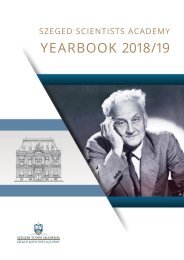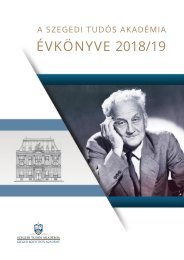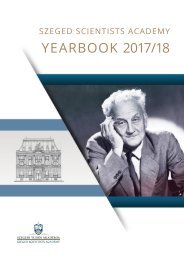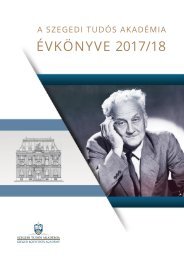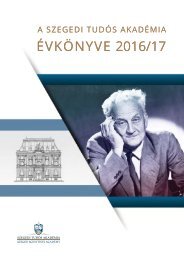SzSA YearBook 2016/17
Create successful ePaper yourself
Turn your PDF publications into a flip-book with our unique Google optimized e-Paper software.
DÁVID TÁLAS<br />
SZENT-GYÖRGYI STUDENTS<br />
Szeged Scientists Academy, 2 nd year<br />
University of Szeged,<br />
Faculty of Medicine, 2 nd year<br />
E: talasdave@icloud.com<br />
T: +36 30/627-9706<br />
DATE OF BIRTH:<br />
1997<br />
SZENT-GYÖRGYI PUPIL:<br />
no<br />
SZENT-GYÖRGYI MENTOR:<br />
Dr. Péter Hegyi<br />
JUNIOR MENTOR:<br />
Dr. Petra Pallagi<br />
SPECIALTY:<br />
gastroenterology<br />
SECONDARY SCHOOL:<br />
Andrássy Gyula Secondary<br />
School, Békéscsaba<br />
NAME OF TEACHER:<br />
Klára Stefanik<br />
LANGUAGES:<br />
English/advanced<br />
IMPORTANCE, AIMS AND POSSIBLE OUTCOME OF RESEARCH<br />
Chronic pancreatitis (CP) is a progressive inflammatory disease which decreases<br />
the life quality and life expectancy of patients. A serious difficulty is that CP<br />
does not have a specific therapy, therefore it leaves treatment options limited<br />
to treating symptoms and pain relief. Smoking and alcohol consumption are<br />
two of the greatest risk factors in the development of CP. It is known that pancreatic<br />
ductal fluid and bicarbonate secretion play a crucial role in the function<br />
of this organ. A previous research conducted by our research group has found<br />
that alcohol disrupts fluid and bicarbonate secretion. One of the most important<br />
membrane proteins playing a central role in these functions is the cystic fibrosis<br />
transmembrane conductance regulator (CFTR) protein, a CFTR Cl - channel. Since<br />
we already know that cigarette smoking is one of the greatest risk factors in the<br />
development of CP, we want to know the effects of smoking on CFTR function<br />
and expression on clinical patients and human tissue samples. Furthermore, we<br />
long to characterize the effects of smoking on pancreatic ductal fluid and HCO 3<br />
-<br />
secretion using in vivo and in vitro physiological and biochemical methods. Understanding<br />
the pathophysiology of the disease could create new therapeutic<br />
targets leading to more effective treatments for chronic pancreatitis.<br />
AIMS DURING HIS CAREER<br />
I would like to do active research during and after my medical studies. My main<br />
goal is to contribute to developing new treatments for patients by describing the<br />
pathomechanisms of the diseases. Passing on my knowledge and experience to<br />
new generations via teaching, mentoring or leading a research group would be<br />
a pleasure.<br />
HONORS AND PRIZES<br />
• <strong>2016</strong> - New National Excellence Program Scholarship<br />
PUBLICATIONS<br />
–<br />
123






